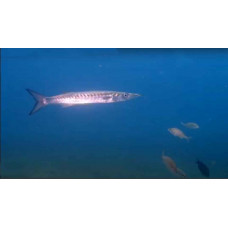Latin name
Sphyraena guachancho
Other names
Guachanche barracuda; Spanish: picuda guaguanche; French: bécune guachanche.
Identification
Silver-olive-brown on top, it has silvery flanks with a yellow-gold band running along the middle of its body. Like other members of the barracuda family, it has an elongated body and large fangs and claws. The caudal fin is large, forked, and blackish, and the dorsal fins are widely separated. The pelvic fin starts below the point just before the first dorsal fin. Young fish have three broad bands on the back of the body that are often interrupted in the middle of each side.
Distribution
Occurs from Massachusetts to northern part of the Gulf of Mexico, southward to Brazil. Occasional in Florida, the Bahamas, and the Caribbean.
Habitat
They live in shallow and usually muddy coastal waters, including sandbanks, meadows, muddy bottoms, bays, and estuaries. It is a schooling species, forming shoals at depths of 3 to 40 feet, and can be found near the surface at night.
Size
It can grow up to 2 feet, though most often it ranges from 6 to 14 inches.
Life history and Behavior
No information
Food and feeding habits
They eat fish and shrimp.
Reproduction
No information
| Classification | |
| Phylum | Chordata |
| Class | Actinopterygii |
| Squad | Istiophoriformes |
| Family | Sphyraenidae |
| Genus | Sphyraena |
| Species | S. guachancho |
| Features | |
| Conservation status | Least Concern |
| Habitat | Littoral |
| Life span, years | 15 |
| Maximum body weight, kg | 1.8 |
| Maximum length, cm | 200 |
| Sailing speed, m/s | 40 |
| Threat to people | Edible |
| Way of eating | predator |
Guaguanche
Tags: Guaguanche



